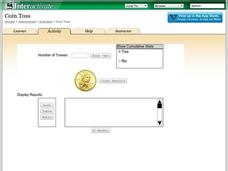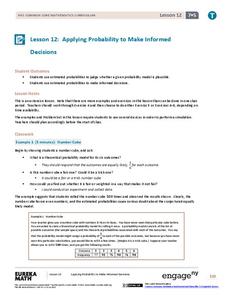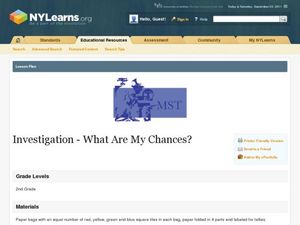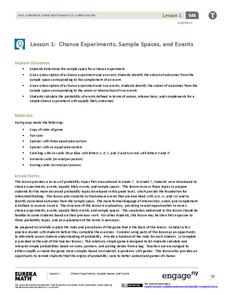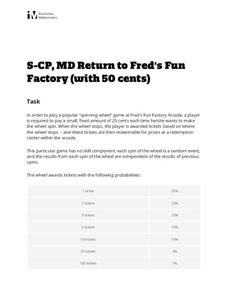Curated OER
Probability of Childhood Games
Students explore the concept of probability. In this probability lesson, students find the probability of certain situations including spinning a spinner, drawing marbles from a bag, and rolling a dice.
Curated OER
Leveled Problem Solving: Experimental Probability
For this using probability to solve word problems worksheet, students use statistics, averages, and even numbers, to problem solve. Students solve six problems.
Curated OER
Playing With Probability
Students rotate through work stations where they compute problems of theoretical and experimental probability. In this probability lesson plan, students use simulations of a lottery system.
Curated OER
Geometric Probabilities
In this geometric probability worksheet, students complete problems involving experimental probability, theoretical probability, and geometric probability. They perform experiments using a specified computer program. This three-page...
Shodor Education Foundation
Coin Toss
Are your young mathematicians having a hard time making heads or tails of probabilities? It's no toss up—here is a resource that's sure to straighten them out! Learners run the interactive to toss a coin a different number of times....
EngageNY
Applying Probability to Make Informed Decisions
Use simulations to determine the probabilities of events to make decisions. Class members are presented with several scenarios, some with known probabilities and others without. Groups run simulations to gather data that they then use to...
EngageNY
Estimating Probability Distributions Empirically 1
What if you don't have theoretical probabilities with which to create probability distributions? The 11th installment of a 21-part module has scholars collecting data through a survey. The results of the survey provide empirical data to...
American Statistical Association
Exploring Geometric Probabilities with Buffon’s Coin Problem
Scholars create and perform experiments attempting to answer Buffon's Coin problem. They discover the relationships between geometry and probability, empirical and theoretical probabilities, and area of a circle and square.
EngageNY
Conducting a Simulation to Estimate the Probability of an Event II
Add some randomization into simulations. The 11th installment in a series of 25 presents two new methods to use in simulations--colored disks, and random numbers. Pupils use random numbers to run simulations where the probabilities make...
Curated OER
Phenomenological Probability
Students explore the concept of theoretical and experimental probability. In this theoretical and experimental probability lesson, students roll dice, draw marbles out of a bag, and draw a card from a deck of cards. Students perform each...
Curated OER
Probability - What Are the Odds?
Students study the concept of probability. In this probability lesson, students define probability and visit an interactive spinner website to learn about theoretical and experimental probability. Students use pennies and work in pairs...
Curated OER
Probability Using M&M's
Students estimate and then count the number of each color of M&M's in their bag. In this mathematics lesson, students find the experimental probability of selecting each color from the bag. Students create pictographs and bar graphs...
Curated OER
Investigation--What Are My Chances?
Seventh graders investigate theoretical and experimental probability by conducting a series of experiments with multiple trials, comparing results, combining results and making conclusions. They express probabilities as fractions,...
EngageNY
Estimating Probability Distributions Empirically 2
Develop probability distributions from simulations. Young mathematicians use simulations to collect data. They use the data to draw graphs of probability distributions for the random variable in question.
CK-12 Foundation
Empirical Probability: Scoring
Learners use an interactive to determine the probability that a soccer player will score a goal. Given data over the course of several days, they determine probabilities for several different situations.
Utah Education Network (UEN)
Probability, Percent, Rational Number Equivalence
Start seventh grade with a bang with the first chapter of an eight-part seventh-grade workbook series that asks learners to work through problems involving simple probability, percents, and rational number equivalence.
Teachnology
Statistics & Probability with Cards
Give young mathematicians a chance to demonstrate their understanding of basic probability with this series of worksheets. Presented with different situations involving dice and decks of cards, students must correctly determine the...
EngageNY
Chance Experiments, Sample Spaces, and Events
Want a leg up on the competition? Show classes how to use mathematics to their advantage when playing games. Learners calculate probabilities to determine a reasonable scoring strategy for a game.
Illustrative Mathematics
Return to Fred's Fun Factory (with 50 Cents)
The penny arcade gets the statistics treatment in this fun probability investigation. A non-standard game of chance is described and then the class is set loose to find missing probabilities, determine common outcomes, and evaluate...
CK-12 Foundation
Numerical Computations: Counting Out Probability
Keep your heads up while counting. Pupils use an interactive to create a table with the possible outcomes of flipping three coins and then determine the probabilities of getting certain combinations of heads and tails.
Curated OER
Probability Experiment Simulation: Design and Data Analysis Using a Graphing Calculator
Seventh graders simulate probability experiments. Using a graphing calculator, 7th graders design, conduct, and draw conclusions from simulations or probability experiments. Students construct frequency tables and compare the...
Mathalicious
Three Shots
To foul or not to foul, that is the basketball question. High schoolers look at the probability that fouling out a player and allowing free throws yields a better outcome than allowing the original shot. The resource provides a teacher's...
Inside Mathematics
Marble Game
Pupils determine the theoretical probability of winning a game of marbles. Individuals compare the theoretical probability to experimental probability for the same game. They continue on to compare two different probability games.
Curated OER
Conditional Probability and Probability of Simultaneous Events
Students explore the concept of conditional probability and probability of simultaneous events. In this conditional probability and probability of simultaneous events lesson plan, students roll dice or use and applet to roll dice to...






